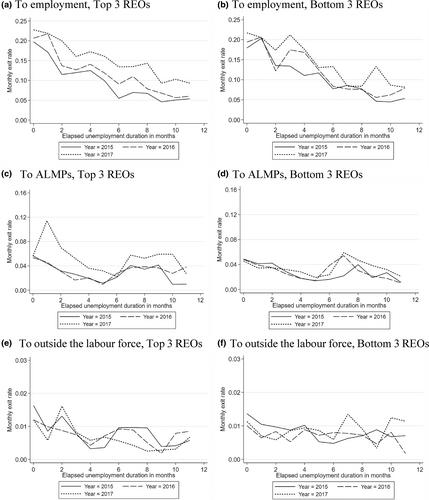定期面试对失业时间的影响:来自2017年芬兰改革的证据
IF 0.7
Q4 INDUSTRIAL RELATIONS & LABOR
引用次数: 0
摘要
2017年,芬兰的一项政策改革加强了公共就业服务机构定期面试失业求职者的做法。这项研究使用了高质量的行政数据来分析面试对失业时间的影响。我们使用了差异中的差异方法,利用了治疗强度的区域差异。我们的研究结果表明,面试概率增加10个百分点,每月就业风险率增加3.1%,其中25-34岁的求职者和低教育水平的求职者的影响最大。此外,我们的研究结果表明,对参与积极的劳动力市场方案有很大影响。本文章由计算机程序翻译,如有差异,请以英文原文为准。

The impact of periodic interviews on unemployment duration: Evidence from the 2017 Finnish reform
In 2017, a Finnish policy reform intensified the Public Employment Services' practice of periodically interviewing unemployed jobseekers. This study used high-quality administrative data to analyse the effect of interviews on unemployment duration. We used a difference-in-differences approach that exploited regional variations in treatment intensity. Our results show that a 10 percentage point increase in interview probability increased the monthly hazard rate of employment by 3.1 per cent, with the effect being strongest among jobseekers aged 25–34 and jobseekers with a low education level. Also, our results demonstrate a strong effect on participation in active labour market programmes.
求助全文
通过发布文献求助,成功后即可免费获取论文全文。
去求助
来源期刊

Labour-England
INDUSTRIAL RELATIONS & LABOR-
CiteScore
1.30
自引率
16.70%
发文量
25
期刊介绍:
LABOUR provides a forum for analysis and debate on issues concerning labour economics and industrial relations. The Journal publishes high quality contributions which combine economic theory and statistical methodology in order to analyse behaviour, institutions and policies relevant to the labour market.
 求助内容:
求助内容: 应助结果提醒方式:
应助结果提醒方式:


